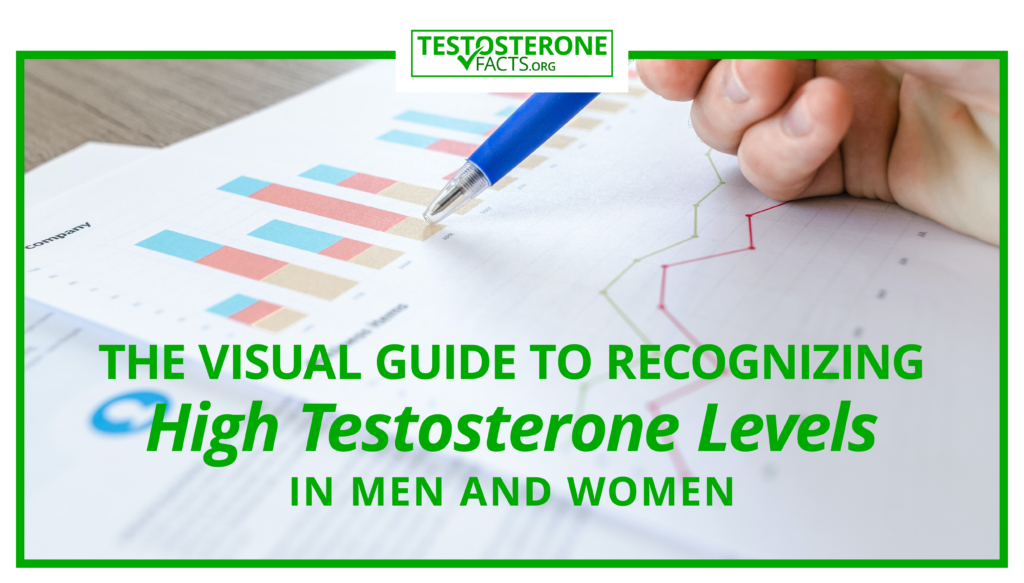
The Visual Guide To Recognizing High Testosterone Levels In Men And Women
- TFacts Staff

Table of Contents
ToggleIntroduction
Are you noticing some unusual changes in your body but not quite sure what’s causing them? Interestingly, it may be due to high testosterone levels which can exceed 836 ng/dL in men and 41 ng/dL in women.
This insightful article will serve as a visual guide, helping you understand the signs of heightened testosterone, its causes, diagnosis and treatment options. Ready to unravel this mystery? Dive in!
Key Takeaways
- High testosterone levels can cause acne in both men and women, as the excess hormone stimulates sebaceous glands to produce more oil, resulting in clogged pores and breakouts.
- Rising testosterone levels can lead to changes in blood pressure, increasing the risk of hypertension and related health issues such as heart disease and stroke.
- Men with high testosterone may experience changes in sexual health, including heightened libido or complications like erectile dysfunction and infertility.
- Mood swings are a common symptom of high testosterone in men, with increased aggression, irritability, and risky behavior being potential indicators.
- Women with high testosterone levels may notice an increase in body hair growth on areas such as the face (hirsutism), chest, abdomen, or back.
- Elevated muscle mass is another sign of high testosterone levels for both men and women. It promotes lean muscle tissue growth which aids strength building during weight training exercises.
- Irregular periods can be indicative of high testosterone levels in women; other symptoms include clitoral enlargement, and chin or upper lip hair growth.
- High testosterone levels can decrease libido or interest in sexual activity for women while also disrupting the normal hormonal balance needed for ovulation and fertility. PCOS is commonly associated with elevated T-levels
- Mood disturbances due to excessive testosterone can affect women’s emotional well – being leading to irritability, rapid mood swings & aggressiveness
- Causes of high – testosterone range from excessive use of supplements/steroids to medical conditions like testicular/adrenal cancers; PCOS & congenital adrenal hyperplasia are common causes too
Signs of High Testosterone in Men
Men with high testosterone levels may experience acne, changes in blood pressure, sexual health issues, and mood swings.

Acne
In both men and women, high testosterone levels can lead to an increase in acne. This is because the excess hormone can stimulate sebaceous glands to produce more oil or sebum, which clogs skin pores and results in acne breakouts.
In men specifically, those with excessive total testosterone of over 836 ng/dL often report severe forms of this condition. Women are not exempt either; even when their free testosterone level exceeds 41 ng/dL, it’s common to see a surge in unsightly pimples.
If you’re noticing recurrent acne despite consistent skincare routines, it may be worth seeking medical advice as this could be a sign of elevated testosterone.
Blood pressure changes
Rising levels of testosterone in both men and women can lead to significant changes in blood pressure. This shift often results in hypertension or high blood pressure, a condition that increases the risk of heart disease and stroke if left unchecked.
In men, excessively high testosterone – above 836 ng/dL – may trigger such hypertensive conditions due to the hormone’s impact on salt retention, thereby leading to an increase in liquid volume within your body.
For women, elevated testosterone levels beyond 41ng/dL also contribute to this issue but with additional complications. High testosterone tends to promote weight gain – another critical factor increasing the risk of hypertension.
It’s crucial for both genders experiencing these symptoms to consult a healthcare provider promptly. Thankfully, lifestyle interventions like low-carbohydrate diets or daily exercise can help mitigate these effects naturally; yet sometimes selecting the best testosterone booster is necessary under medical guidance.
Sexual Health in Men
High testosterone levels can significantly impact a man’s sexual health. An indication of excessive testosterone might be changes in sex drive, with some men experiencing a heightened libido.
This is due to testosterone being the primary hormone that influences sexual desire and performance in males. Notably, excess levels may also lead to complications such as erectile dysfunction or infertility.
Exploring further into the correlation between high testosterone and erectile dysfunction reveals an imbalanced hormonal environment as the root causative factor. In particular, when abundant in supply, this vital male hormone alters normal physiological functions thereby causing conditions like premature ejaculation.
Moreover, an increased risk of certain forms of cancer could come into play given persistent elevated total levels above 836 ng/dL over time which fits well within our understanding of it being one the best testosterone booster if used sparingly or within a healthy range.
Mood changes in men
High testosterone levels in men can lead to noticeable mood changes. Increased levels of this hormone have been associated with heightened aggression, irritability, and even an increased likelihood of risky behavior.
These mood swings can range from feelings of anger or frustration to sudden bursts of energy or euphoria. It’s important to note that not all men with high testosterone will experience drastic mood shifts, as individual responses can vary.
However, if you find yourself experiencing significant changes in your moods alongside other signs of elevated testosterone, it may be worth exploring further with a healthcare professional for guidance on managing and balancing your hormonal levels effectively.
Signs of High Testosterone in Women
High testosterone levels in women can lead to increased body hair, muscle mass, irregular periods, sexual health issues, and mood changes. Discover how to recognize these signs and what it means for your overall health.
Read more to empower yourself with knowledge about high testosterone levels in women.

Body hair
One common sign of high testosterone levels in both men and women is an increase in body hair. In men, this often presents as excessive hair growth on the face, chest, back, and arms. Men with high testosterone may also notice thicker and coarser hair texture compared to before.
In women, high testosterone can cause the development of coarse facial hair known as hirsutism. Body hair growth may also become more prominent on the chest, abdomen, or back for some women.
It’s important to note that while some level of body hair is normal for both genders, a sudden or excessive increase may indicate higher-than-average testosterone levels. If you are concerned about your body’s hair growth patterns or suspect that your testosterone levels might be imbalanced, it’s essential to consult with a healthcare professional who can provide proper diagnosis and guidance on treatment options.
Increased muscle mass
High testosterone levels can lead to increased muscle mass in both men and women. When testosterone levels are elevated, it promotes the growth of lean muscle tissue, allowing individuals to build strength and achieve a more defined physique.
This is why many athletes and bodybuilders seek ways to naturally boost their testosterone levels for enhanced performance.
For men, high testosterone levels can result in greater gains during weight training exercises and improved athletic performance overall. It helps increase protein synthesis in muscles, leading to more efficient recovery and growth.
However, it’s important for men to maintain a balanced approach as excessively high testosterone levels may have negative effects on the body.
Similarly, women with high testosterone may notice an increase in muscle mass. While societal stereotypes often associate muscularity with masculinity, it’s important to understand that women naturally have lower levels of testosterone compared to men.
Nonetheless, higher-than-usual amounts of this hormone can still contribute to increased muscle development in women.
Irregular periods
Irregular periods can be a potential sign of high testosterone levels in women. Women with elevated testosterone may experience changes in their menstrual cycle, such as infrequent or unpredictable periods.
This hormonal imbalance can disrupt the normal ovulation process and affect fertility. In addition to irregular periods, other symptoms of high testosterone in women include weight gain, acne, clitoral enlargement, and hair growth on the chin or upper lip.
It’s important to consult with a healthcare professional if you’re experiencing these symptoms to determine the underlying cause and explore appropriate treatment options for hormone balance.
Sexual Health in Women
Sexual health is an important aspect of overall well-being for women. High testosterone levels in women can have a significant impact on their sexual health. One common symptom of high testosterone in women is a decrease in libido or sex drive.
This can lead to decreased interest and enjoyment in sexual activity. Additionally, high testosterone levels can cause irregular periods and may even disrupt the normal hormonal balance needed for ovulation and fertility.
It’s important to note that while high testosterone levels can affect sexual health, there are various treatment options available to help manage these symptoms and restore hormonal balance.
In some cases, high testosterone levels in women may also lead to the development of polycystic ovary syndrome (PCOS). PCOS is a condition characterized by multiple cysts on the ovaries and hormonal imbalances that can result in irregular periods, infertility, weight gain, and acne.
Mood changes in women
High testosterone levels in women can have a significant impact on mood. While it is normal to experience occasional mood swings, excessive testosterone can intensify these changes. Women with high testosterone may find themselves feeling more irritable, agitated, or experiencing rapid shifts in emotions.
Additionally, they may also notice an increase in aggressive behaviors.
These mood changes occur due to the hormonal imbalance caused by high testosterone levels. It’s important for women to be aware of these symptoms as they can indicate underlying health issues such as polycystic ovary syndrome (PCOS) or other conditions affecting hormone production.
Seeking medical advice and exploring treatment options can help regulate hormone levels and alleviate mood disturbances associated with high testosterone levels.
Causes of High Testosterone Levels
There are several potential causes of high testosterone levels in both men and women. One common cause is the excessive use of testosterone supplements or anabolic steroids. These substances can artificially boost testosterone levels, leading to hormonal imbalances and potential health risks.
Additionally, certain medical conditions can contribute to high testosterone levels, such as testicular or adrenal cancers. When these tumors produce excess testosterone, it can result in elevated hormone levels.
In women, one primary cause of high testosterone is polycystic ovary syndrome (PCOS). This condition affects the ovaries and results in hormonal imbalances that disrupt regular menstrual cycles and lead to increased production of androgens like testosterone.
Another possible cause is congenital adrenal hyperplasia (CAH), a genetic disorder that affects hormone production by the adrenal glands. CAH can cause an overproduction of hormones including testosterone.
It’s important to consult with a healthcare professional if you suspect you have high testosterone levels to determine the underlying cause and explore appropriate treatment options tailored to your specific situation.
Diagnosing High Testosterone Levels
- Blood tests: One of the most common methods used to diagnose high testosterone levels is through a blood test. This test measures the levels of testosterone in your bloodstream and can indicate whether they are within a normal range or elevated.
- Physical examination: A doctor may also perform a physical examination to look for signs and symptoms associated with high testosterone levels. This may include checking for acne, excess body hair, enlarged clitoris in women, and other physical indicators.
- Medical history review: Your doctor will likely ask you about your medical history, including any symptoms you may have been experiencing. They may also inquire about any medications or supplements you are taking that could potentially affect your hormone levels.
- Hormone panel testing: In some cases, a doctor may order additional hormonal tests to determine the underlying cause of high testosterone levels. These tests can help identify any imbalances in other hormones that could contribute to elevated testosterone.
- Imaging tests: If there is suspicion of an underlying condition causing high testosterone levels, such as ovarian cysts or tumors, imaging tests such as ultrasounds or MRI scans may be ordered to visualize the reproductive organs and adrenal glands.
Remember, diagnosing high testosterone levels requires professional evaluation and medical testing. It’s important to consult with a healthcare provider who can accurately assess your hormone levels and provide appropriate treatment options if needed.
Treatment Options for High Testosterone Levels in Men and Women
High testosterone levels in both men and women may require treatment to manage symptoms and reduce the risk of complications. Treatment options for high testosterone levels depend on the underlying cause and can vary between individuals.
In men, if high testosterone is caused by anabolic steroid misuse or excessive use of testosterone gel, discontinuing these substances is typically recommended.
For women with polycystic ovary syndrome (PCOS), lifestyle modifications are often the first line of treatment. This can include adopting a low-carbohydrate and low-dairy diet, which has been shown to help lower testosterone levels in women with PCOS.
Weight loss may also be beneficial as it can improve hormonal balance.
In some cases, medication may be prescribed to regulate hormone levels. Anti-androgen medications such as spironolactone or flutamide can block the effects of excess testosterone in both men and women.
These medications work by preventing the binding of testosterone to receptor sites in certain tissues.
For individuals with underlying medical conditions causing high testosterone, such as testicular or adrenal cancers in men or congenital adrenal hyperplasia in women, specific treatments will be targeted at addressing those conditions.
It’s important to note that any treatment plan should be personalized based on individual needs and always done under the guidance of a healthcare professional. Regular monitoring of hormone levels is also essential to ensure treatment effectiveness and adjust dosage accordingly.
Overall, understanding treatment options for high testosterone levels is crucial for managing symptoms and promoting overall well-being in both men and women affected by this hormonal imbalance.

When to See a Doctor
If you’re experiencing any of the symptoms associated with high testosterone levels, it’s important to consult with a doctor. In men, signs such as acne, blood pressure changes, sexual health issues, and mood swings can indicate elevated testosterone levels.
For women, symptoms like increased body hair growth, irregular periods or lack thereof, changes in sexual health, and mood shifts may suggest higher-than-normal testosterone levels. It’s crucial to seek medical advice for proper diagnosis and treatment options.
High testosterone levels can lead to complications such as infertility or an increased risk of certain cancers in both men and women. Additionally, excessive amounts of this hormone in women could be indicative of reproductive disorders like polycystic ovary syndrome (PCOS).
Remember that only a healthcare professional can accurately diagnose high testosterone levels and provide appropriate guidance for your specific situation.
The Bottom Line
In conclusion, recognizing the signs of high testosterone levels in both men and women is important for understanding potential health issues and seeking appropriate treatment. High testosterone levels can have various effects on the body, including acne, blood pressure changes, sexual health issues, mood swings, irregular periods, increased muscle mass, and more.
It’s crucial to note that excessive levels of testosterone can lead to infertility and an increased risk of certain types of cancer. If you experience any symptoms associated with high testosterone or suspect hormonal imbalances, it’s essential to consult with a doctor for proper diagnosis and guidance toward suitable treatment options.
Remember that maintaining hormone balance is crucial for overall well-being and quality of life.
FAQs
1. What are the physical signs of high testosterone levels in men and women?
In men, physical signs of high testosterone levels may include increased muscle mass, facial hair growth, deepening of the voice, and more aggressive behavior. In women, these signs may manifest as excessive facial or body hair growth, acne breakouts, a deeper voice, and an enlarged clitoris.
2. Can high testosterone levels affect mood and emotional well-being?
Yes, high testosterone levels can potentially affect mood and emotional well-being in both men and women. It has been associated with increased aggression or irritability in some individuals.
3. Are there any other symptoms that might indicate high testosterone levels in men and women?
Other symptoms that may indicate high testosterone levels include irregular menstrual cycles or absence of periods in women, infertility issues for both genders, decreased breast size in females due to reduced estrogen effects on breast tissue, and difficulty sleeping for both genders due to hormonal imbalances affecting sleep patterns.
4. Is it necessary to seek medical attention if I suspect I have high testosterone levels?
If you suspect you have high testosterone levels based on physical signs or persistent symptoms mentioned above – it is important to consult with a healthcare professional for accurate diagnosis & appropriate treatment options tailored specifically towards your health needs rather than attempting self-diagnosis/management which could lead potential risks especially since many underlying conditions mimic similar presentations, therefore, clinical evaluation becomes crucial aspect before initiating therapies




